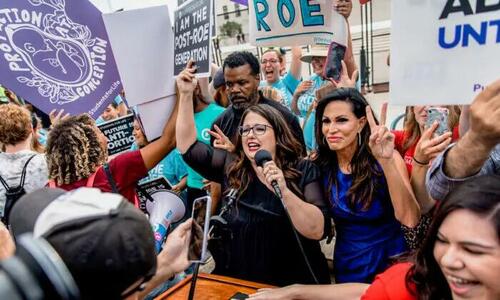
Authored by Samantha Flom via The Epoch Times (emphasis ours),
A majority of Gen Z and millennial voters say legal rights should begin in the womb and that abortion should only be an option under certain circumstances, according to a new poll.

The Students for Life Action/YouGov poll released on Jan. 16 found that 54 percent of voters ages 18 to 42 believe human rights should begin in the womb, compared with 32 percent who said they should begin after birth.
Additionally, 65 percent of voters said they supported at least some limits on abortion—the same percentage as last year. However, 75 percent supported restrictions at or before viability, up 10 percent from 2023.
By contrast, 25 percent of respondents expressed support for unlimited abortion through all nine months of pregnancy—including 9 percent who would allow the death of a baby born alive in a botched abortion.
“Changing hearts and minds on the human rights issue of abortion means being specific,” said Kristan Hawkins, president of Students for Life of America (SFLA) and the Demetree Institute for Pro-Life Advancement.
“In light of ballot initiatives, misinformation on protections in place for women’s lives, and radical abortion policies pushed by those who don’t care about what happens to mothers and their preborn children, we wanted to explore just what the Youth Vote—Gen Z and millennials—are thinking. Far from being lock-step for abortion, many are open to conversation and willing to consider pro-life policies.”
One key finding of the poll was that the vast majority of Gen Z and millennial voters want to see more legislative support for mothers, newborns, and families. Measures like paid family leave for new parents, child tax credits, childcare subsidies, support services and programs, and laws to keep the health care costs of pregnancy affordable all received overwhelming support, with just 5 percent of respondents rejecting all of the options presented.
“Reaching the key voting bloc that is the Youth Vote doesn’t mean running away from the issue of abortion. It means talking specifically about how to protect life in law and in service and about plans to help women survive their exposure to an abortion industry that profits from death,” Ms. Hawkins said.
“The Youth Vote, like most Americans, rejects the late-term abortion extremism seen in numerous state ballot initiatives, Biden administration regulation, and Pelosi-pushed policies.”
Abortion on the Ballot
With the 2024 election just months away, initiatives to legislate abortion at the ballot box have cropped up in states around the country.
In November, abortion proponents in several states will look to replicate the recent success of Ohio’s Issue 1, a citizen-led ballot initiative that cemented a right to abortion in the state’s constitution.
Pro-life advocates, however, have criticized such efforts as deceitful attempts to confuse voters. Measures like Issue 1, they say, are deliberately crafted with vague language to trick voters into allowing loopholes for late-term abortions.
With its latest survey, Students for Life sought to determine the impacts of abortion-related misinformation on young voters, finding that only 14 percent were aware that all 50 states currently allow abortion in circumstances where the mother’s life is at risk. One-third (35 percent) said they believed most states had such protections in place, and nearly half (49 percent) said they believed that was true of “only some or a few” states. Another 2 percent said they believed women’s lives were not legally protected at all.
Additionally, 64 percent of voters said they were more concerned than ever about women’s lives being at risk due to unplanned pregnancies, with 58 percent attributing their heightened concern to media reports.
Most voters (57 percent) also said they want required reporting of abortion data to track complications from abortion and other statistics. Currently, no such requirement exists at the national level.
Political Perspectives
Gen Z and Millennial voters are on track to make up a majority of the American electorate by 2028, according to the Brookings Institution. And the survey shows that most of them—55 percent—rank abortion among their top three political issues.
Moreover, 40 percent said they prefer candidates who support abortion limits, with 16 percent preferring those who fight “strongly in favor of abortion restriction.”
Yet in the wake of the U.S. Supreme Court’s reversal of Roe v. Wade, the largely pro-life Republican Party has openly struggled to connect with voters on abortion, unable to articulate a stance that most party members can support.
Some candidates, fearing political suicide, have opted to avoid the issue completely. But Ms. Hawkins contended that the survey’s results show it would benefit the GOP to adopt a clear position.
“On the human rights issue of our day—abortion—the fine print matters,” she said. “Those urging GOP politicians to ignore this vital issue are making a mistake and should take a look at these findings to develop concrete plans and policies.
“The humanity of the preborn matters to many people, and support for the practical policies that help young families builds good will with young voters,” she added. “A swing in the pro-life/pro-family Youth Vote voter participation rate can become a game changer in this election.”
The Students for Life Action/YouGov survey was conducted in early January and has a margin of error of 3.52 percentage points.
Authored by Samantha Flom via The Epoch Times (emphasis ours),
A majority of Gen Z and millennial voters say legal rights should begin in the womb and that abortion should only be an option under certain circumstances, according to a new poll.

The Students for Life Action/YouGov poll released on Jan. 16 found that 54 percent of voters ages 18 to 42 believe human rights should begin in the womb, compared with 32 percent who said they should begin after birth.
Additionally, 65 percent of voters said they supported at least some limits on abortion—the same percentage as last year. However, 75 percent supported restrictions at or before viability, up 10 percent from 2023.
By contrast, 25 percent of respondents expressed support for unlimited abortion through all nine months of pregnancy—including 9 percent who would allow the death of a baby born alive in a botched abortion.
“Changing hearts and minds on the human rights issue of abortion means being specific,” said Kristan Hawkins, president of Students for Life of America (SFLA) and the Demetree Institute for Pro-Life Advancement.
“In light of ballot initiatives, misinformation on protections in place for women’s lives, and radical abortion policies pushed by those who don’t care about what happens to mothers and their preborn children, we wanted to explore just what the Youth Vote—Gen Z and millennials—are thinking. Far from being lock-step for abortion, many are open to conversation and willing to consider pro-life policies.”
One key finding of the poll was that the vast majority of Gen Z and millennial voters want to see more legislative support for mothers, newborns, and families. Measures like paid family leave for new parents, child tax credits, childcare subsidies, support services and programs, and laws to keep the health care costs of pregnancy affordable all received overwhelming support, with just 5 percent of respondents rejecting all of the options presented.
“Reaching the key voting bloc that is the Youth Vote doesn’t mean running away from the issue of abortion. It means talking specifically about how to protect life in law and in service and about plans to help women survive their exposure to an abortion industry that profits from death,” Ms. Hawkins said.
“The Youth Vote, like most Americans, rejects the late-term abortion extremism seen in numerous state ballot initiatives, Biden administration regulation, and Pelosi-pushed policies.”
Abortion on the Ballot
With the 2024 election just months away, initiatives to legislate abortion at the ballot box have cropped up in states around the country.
In November, abortion proponents in several states will look to replicate the recent success of Ohio’s Issue 1, a citizen-led ballot initiative that cemented a right to abortion in the state’s constitution.
Pro-life advocates, however, have criticized such efforts as deceitful attempts to confuse voters. Measures like Issue 1, they say, are deliberately crafted with vague language to trick voters into allowing loopholes for late-term abortions.
With its latest survey, Students for Life sought to determine the impacts of abortion-related misinformation on young voters, finding that only 14 percent were aware that all 50 states currently allow abortion in circumstances where the mother’s life is at risk. One-third (35 percent) said they believed most states had such protections in place, and nearly half (49 percent) said they believed that was true of “only some or a few” states. Another 2 percent said they believed women’s lives were not legally protected at all.
Additionally, 64 percent of voters said they were more concerned than ever about women’s lives being at risk due to unplanned pregnancies, with 58 percent attributing their heightened concern to media reports.
Most voters (57 percent) also said they want required reporting of abortion data to track complications from abortion and other statistics. Currently, no such requirement exists at the national level.
Political Perspectives
Gen Z and Millennial voters are on track to make up a majority of the American electorate by 2028, according to the Brookings Institution. And the survey shows that most of them—55 percent—rank abortion among their top three political issues.
Moreover, 40 percent said they prefer candidates who support abortion limits, with 16 percent preferring those who fight “strongly in favor of abortion restriction.”
Yet in the wake of the U.S. Supreme Court’s reversal of Roe v. Wade, the largely pro-life Republican Party has openly struggled to connect with voters on abortion, unable to articulate a stance that most party members can support.
Some candidates, fearing political suicide, have opted to avoid the issue completely. But Ms. Hawkins contended that the survey’s results show it would benefit the GOP to adopt a clear position.
“On the human rights issue of our day—abortion—the fine print matters,” she said. “Those urging GOP politicians to ignore this vital issue are making a mistake and should take a look at these findings to develop concrete plans and policies.
“The humanity of the preborn matters to many people, and support for the practical policies that help young families builds good will with young voters,” she added. “A swing in the pro-life/pro-family Youth Vote voter participation rate can become a game changer in this election.”
The Students for Life Action/YouGov survey was conducted in early January and has a margin of error of 3.52 percentage points.
Loading…





